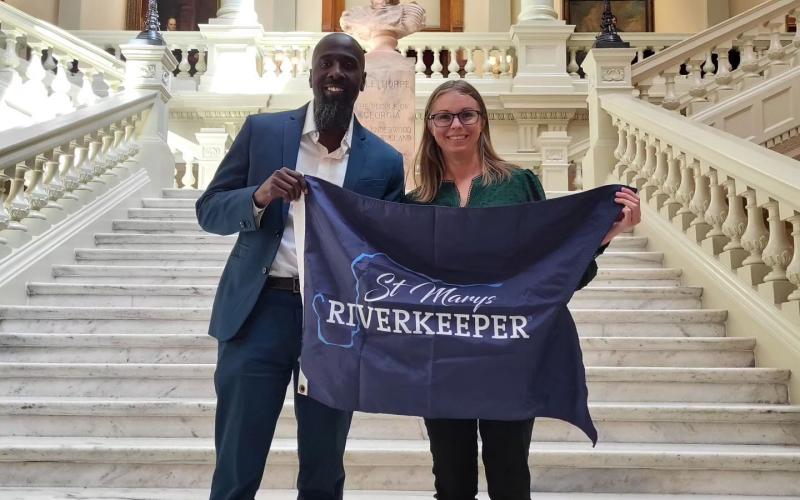The St. Marys Riverkeeper voiced its opposition to a proposed mining project in the Okefenokee Swamp in public comment regarding a bill in the Georgia legislature.
Georgia House Bill 71 (called the “Okefenokee Protection Act”) would prevent Georgia’s director of Environmental Protection Division of the Natural Resources Department from issuing or renewing any permits for mining on Trail Ridge, near the Okefenokee Swamp, the headwaters of the St. Marys River.
Twin Pines Minerals, LLC applied for the permits to mine titanium on Trail Ridge. Despite assurances from the company that the surface mine would cause no significant nor permanent damage to the swamp, environmentalists remain concerned about the project. The mine would cover an area of 580 acres nearly three miles from the swamp.
“Riverkeeper is concerned that the proposed mine as presented to Georgia Environmental Protection Division will negatively impact the St. Marys River watershed ecosystem,” the Riverkeeper said in public comment. “Riverkeeper’s comments focus on the significant risk of failure and the use of several experimental and untested techniques for sand mining due to the catastrophic events that could happen should something go wrong.”
“The St. Marys River and its headwaters, the Okefenokee Swamp, are pristine waterways and loved by locals and all who come to experience its scenic wilderness,” the Riverkeeper continued. “The St. Marys River and Okefenokee Swamp are too important to risk with untested mining methods from a company that does not have experience in greenfield mining and has a negative track record of environmental stewardship.”
A 2019 article from the Georgia Recorder reported “massive fish kills, state environmental investigations and lawsuits by nearby cattle ranchers” as a result of two wood-fired power plants run by Twin Pines that promised a new source of electricity and an economic boom for the local community.
In response to the bill, Twin Pines attorney Lewis Jones hinted at a lawsuit should the bill be passed. It would not be the first lawsuit filed in the nearly four years it has been since the company started the process of applying for permits and building the mine.
Georgia House Natural Resources and Environment Committee Chair Rep. Lynn Smith said she has no plans to “rush something that’s controversial.” The bill is not scheduled for a vote this session.
The Okefenokee Swamp is the largest blackwater swamp in North America. Not only does its health heavily impact the health of the St. Marys River, but it is also home to gopher tortoises, barred owls, sandhill cranes, an estimated 15,000 alligators and other birds, reptiles and mammals. Many endangered and protected species call the Okefenokee Wildlife Refuge home.
hdorman@fbnewsleader.com





